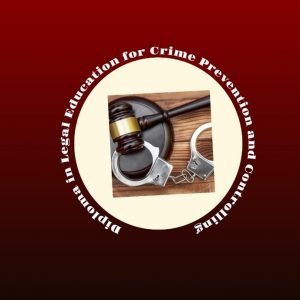

The main purpose and focus of this course are to produce a person with focused criminal psychological and counseling knowledge, techniques and skills in a particular field for the requirement of the contemporary social issues. Criminal psychology, also referred to as criminological psychology, is the study of the views, thoughts, intentions, actions and reactions of criminals and all that partakes in criminal behavior. It is related to the field of criminal anthropology. The study goes deeply into what makes someone commit a crime, but also the reactions after the crime, on the run or in court. Criminal psychologists are often called up as witnesses in court cases to help the jury understand the mind of the criminal. Some types of psychiatry also deal with aspects of criminal behavior. Criminal behavior can be stated as “Any kind of antisocial behavior, which is punishable usually by law but can be punished by norms, stated by community,” therefore, it is difficult to define it as there is a fine line between what could be considered okay and what is considered not to be, being considered as violation at one point of time may now be accepted by community.
This situation, the knowledge and application of criminal psychology and counseling is very essential part of the criminal Justice system. Through this course basically aimed to fulfill above requirement in conceptual and theoretical as well as practical manner.
Especially in Criminal Justice system there is some confuse and complicated issues and those are negatively damage of the image of institutional functions. As the example the question of competency to stand trial is a question of an offender’s current state of mind. This assesses the offender’s ability to understand the charges against them, the possible outcomes of being convicted/acquitted of these charges and their ability to assist their attorney with their defense. The question of sanity/insanity or criminal responsibility is an assessment of the offender’s state of mind at the time of the crime. This refers to their ability to understand right from wrong and what is against the law. The insanity defense is rarely used, as it is very difficult to prove. If declared insane, an offender is committed to a secure hospital facility for much longer than they would have served in prison theoretically, that is. Legal psychologists or known as Criminal psychologists are the ones who make the decisions on offenders. This diploma course will be addressed to identify crime and victimization through criminal psychological aspects and will guide to students how to utilize these knowledges with counselling ability to control and prevent crimes in society.
| Program title | Diploma in Criminal Psychology and Offender Counseling |
| Final award | Diploma in Criminal Psychology and Offender Counseling |
| Sri Lanka Qualification Framework (SLQF) Level | Level 3 |
| Exit Award/Fall-back Award, if any | Students should complete the diploma within two years of time |
| Sri Lanka Qualification Framework (SLQF) Level of exit award/fall back award, if any | Not applicable |
| Program Code | DCPOC |
| Cohort(s) program/s to which this program specification is applicable | Not applicable |
| Awarding institution/body/university | University of Sri Jayewardenepura |
| Teaching Department | Department of Criminology and Criminal Justice |
| Faculty | Faculty of Humanities and Social Sciences |
| Language of study and assessment | Sinhala |
| Department web page address | http://fhss.sjp.ac.lk/criminology/ |
| Method of study (Full-time/Part-time/Split/Other | Part time |
| Mode of teaching/delivery (Direct classroom teaching/online/distance etc.) | Direct classroom teaching |
| Total no of notional hours | 1500 |
| Credit value of the program | 30 |
| Maximum and minimum period of registration | Three months from the application closing date |
| Placement and/or study abroad, if any | Applicable |
| Criteria for admission to the program (including SLQF level) | Pass the GCE Advanced Level Examination in two Subjects. SLQF level 2 OR NVQF Level 4 Professional or any other equivalent qualifications accepted by the Senate AND Pass the aptitude test or the interview. |
| Length/duration of the program | 1 One Year |
| Progression | Completion of Diploma in Criminal Psychology and Offender Counseling (DCPOC) meets the minimum entry requirement for a qualification in Higher Diploma in Criminology and Criminal Justice. |
| Course code | Course title | Credit value | notional hours | |
| Direct contact hours | Self learning | |||
| First semester | ||||
| DLECPC 110 | Introduction of Criminology, Criminal Justice Administration | 3 | 30 | 100 |
| DLECPC 120 | Sri Lankan society, culture, and kinship | 3 | 30 | 100 |
| DLECPC 130 | Legal history and legal system of Sri Lanka | 3 | 30 | 100 |
| DLECPC 140 | Public law and private law | 3 | 30 | 100 |
| DLECPC 150 | Criminal Law, Criminal Procedure and law evidence | 3 | 30 | 100 |
| second semester | ||||
| DLECPC 210 | Introduction to Criminological Research Methods and Independent Research Report | 3 | 30 | 100 |
| DLECPC 220 | Environmental Law or Conflict of Laws | 3 | 30 | 100 |
| DLECPC 230 | International human rights law, fundamental law | 3 | 30 | 100 |
| DLECPC 240 | International Relation and Conflict Resolution | 3 | 30 | 100 |
| DLECPC 250 | Constitution Law, Rule and Regulation | 3 | 30 | 100 |
| 3 | 30 | 100 | ||
